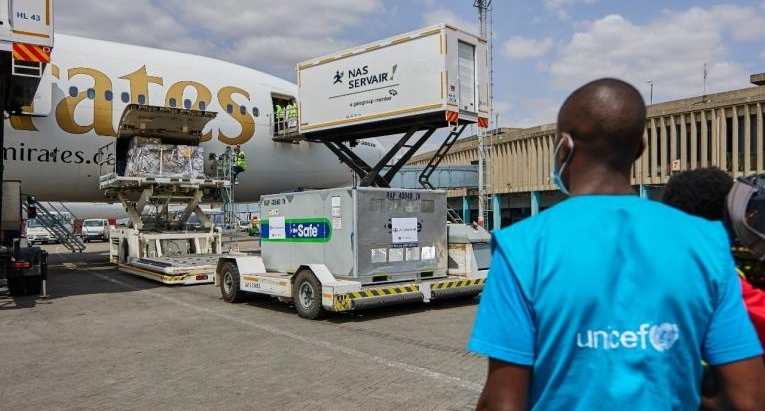Emirates carries 410k doses of Covid-19 vaccine to Kenya
On July 31, 410,000 doses of the AstraZeneca-Oxford Covid-19 vaccine arrived at Jomo Kenyatta International Airport, in Nairobi through an Emirates flight.

August 02, 2021: On July 31, 410,000 doses of the AstraZeneca-Oxford Covid-19 vaccine arrived at Jomo Kenyatta International Airport, in Nairobi through an Emirates flight. The vaccines were donated by the United Kingdom government and transported by UNICEF. This will be followed by a further donation of 407,000 doses from the UK via the COVAX facility. The flight was met at the airport by senior Kenya government officials led by ministry of health chief administrative secretary Mercy Mwangangi, British deputy high commissioner Josephine Gauld, UNICEF chief of health Yaron Wolman, and WHO representative to Kenya Rudi Eggers.
NAS Servair, the Kenyan subsidiary of Servair, handled the shipment.
“The government of Kenya is very grateful to the United Kingdom for this generous donation, which will support the further roll out of our national Covid-19 vaccination programme,” Mwangangi said. “This comes at a critical time as we are rolling out the second dose of vaccination. It will ensure our health workers, teachers and other essential workers are protected, and that hospitals and health centres across Kenya will be able to continue providing essential care to people affected by Covid-19.”
“Our health partnership with Kenya is 30 years old and growing stronger by the month. We are pleased to be supporting Kenya’s vaccination roll-out with this donation of 817,000 Covid-19 vaccines to save lives in Kenya,” Gauld said. “This donation is just the latest part of our incredibly strong partnership on Covid-19, and our Strategic Partnership with Kenya. From Covid-19 vaccines and genomic sequencing, to exchanges on cancer research and treatment to help Kenya treatment more cancer patients at home, the UK has a long and proud history of support for Kenya’s health sector.”
The roll out of the national vaccination campaign is being led by the ministry of health, with support from WHO, UNICEF, Gavi and other partners.
“UNICEF is delighted to once again be supporting the government of Kenya in transporting and distributing these vital Covid-19 vaccines,” Wolman said. “We know that vaccines save lives, keep health and other essential services running, and support economic recovery. In a global pandemic, with new and more dangerous variants emerging, no one is safe until everyone is safe. That’s why vaccine equity is essential if we are to level the playing field and ensure that everyone at risk from Covid-19 gets vaccinated, wherever they live.”
The World Health Organisation, meanwhile, urged the public to maintain public health measures while the national vaccination campaign continues to be rolled out.


